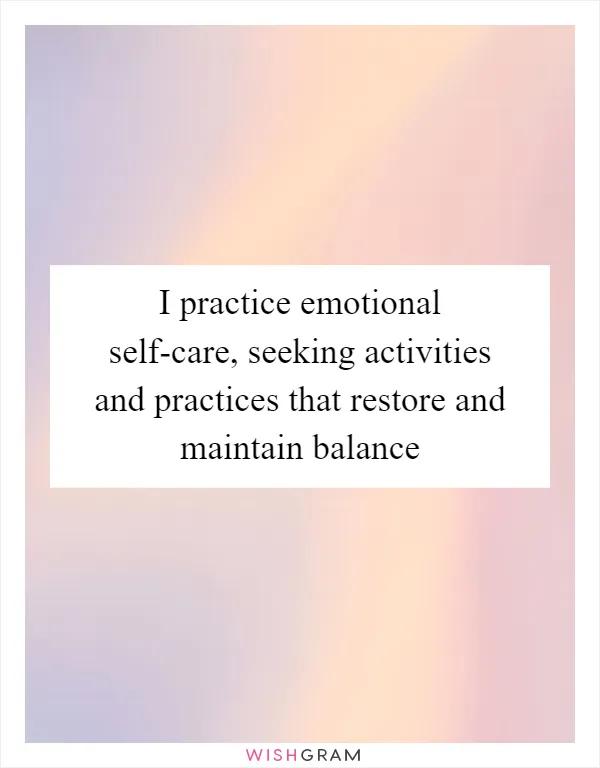I practice emotional self-care, seeking activities and practices that restore and maintain balance
Emotional self-care is a crucial aspect of maintaining overall well-being and balance in our lives. It involves consciously engaging in activities and practices that nurture and support our emotional health, allowing us to effectively manage stress, navigate challenging situations, and cultivate a positive mindset. By prioritizing emotional self-care, we empower ourselves to lead more fulfilling lives and develop resilience in the face of adversity.
One of the key elements of emotional self-care is self-awareness. It entails recognizing and acknowledging our emotions, understanding their underlying causes, and accepting them without judgment. This awareness enables us to identify when we need to take steps to restore balance and invest in activities that support our emotional well-being.
Engaging in activities that bring us joy, comfort, and relaxation is a vital part of emotional self-care. Each individual has unique preferences, so it's important to explore and discover what works best for us. It could involve practicing mindfulness or meditation to cultivate inner peace and calmness. These practices help us to stay present in the moment, let go of worries, and alleviate stress.
Expressive activities such as journaling, writing, or creating art can also be therapeutic. They provide a healthy outlet for processing emotions, releasing pent-up feelings, and gaining insights into our experiences. Similarly, engaging in physical activities like yoga, dancing, or going for a walk in nature can help to release tension, boost mood, and increase our overall well-being.
Seeking support from others is another valuable aspect of emotional self-care. It can involve reaching out to friends, family, or a therapist to share our thoughts and feelings. Connecting with others who are empathetic and understanding provides a sense of validation and helps us to feel supported. Sometimes, simply talking about our emotions can provide immense relief and clarity.
Setting boundaries is an important practice within emotional self-care. It involves identifying what is emotionally draining or toxic in our lives and taking steps to protect ourselves. This might mean saying no to excessive commitments, setting limits on our availability, or distancing ourselves from negative influences. By establishing healthy boundaries, we create space for activities and relationships that truly nourish us.
Lastly, self-compassion is a vital component of emotional self-care. It entails treating ourselves with kindness, understanding, and acceptance, particularly during challenging times. Rather than being self-critical or judgmental, we can practice self-compassion by acknowledging our struggles, offering ourselves words of encouragement, and practicing forgiveness.
In conclusion, emotional self-care is an ongoing practice that requires intention and attention. By prioritizing activities and practices that restore and maintain emotional balance, we empower ourselves to live healthier, more fulfilling lives. It is through nurturing our emotional well-being that we can develop resilience, cultivate positive relationships, and navigate life's ups and downs with grace.
